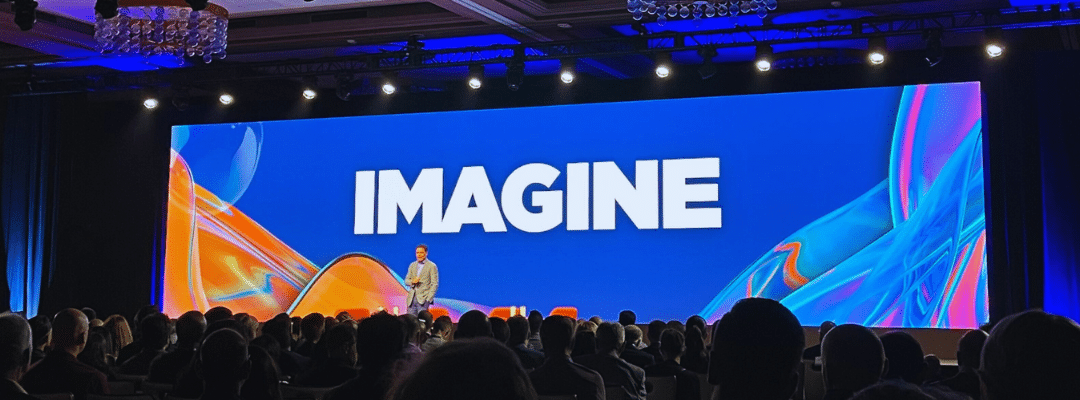You didn’t have to be a tech whiz to recognize big names at this year’s Automation Anywhere IMAGINE Summit. CNN’s Fareed Zakaria was a keynote speaker, and many presenters at the breakout sessions were from household name companies, from Mars to Boston Children’s Hospital to Google.
I was just one of the 40,000+ attendees at this event. With people from thousands of different companies spanning dozens of industries, I expected to hear a lot of different opinions. Instead, I found many nuanced takes on the same themes. Here are some of the main takeaways that were reiterated throughout the conference that I, as an executive from an automation company, loved.
AI is Eating the World
If you’ve ever been to Disney World, you probably visited EPCOT. It’s fascinating to see the latest innovations in technology, how people are using and implementing inventions, and how we may open more possibilities in the future.
The Automation Anywhere IMAGINE conference was the EPCOT of automation. The event was a microcosm of the smartest ways AI is shaping how people do business and how it will transform the future.
For example, Center of Excellence (CoE) members at Boston Children’s Hospital showed how automation and generative GI are helping revolutionize pediatric patient care, reducing backlogs, advancing problem-solving, and unlocking new possibilities for care delivery. Similarly, employees from Paramount presented their CoE’s plan for hyper-automation, which included using an automation platform to better understand key terms and vendor information in contracts.
These examples — and many more — demonstrated how automation AI is helping customers recognize companies as AI companies. AI technologies like large language models (LLMs) are helping customers understand their data and helping AI take action on it. This phenomenon is “Operational AI,” as Ken Mertzel put it.
On the other hand, AI is humanizing tech. It’s a paradox, but the more code and automated processes a company has, the more personalized interactions it can have with a customer. From recommendations to better chatbot conversations, robots are actually making business more human.
The biggest takeaway from the conference is that AI is eating the world. AI affects companies in every industry, accelerating businesses in multiple countries and building relationships between business functions. The breakout sessions at this conference were proof of how AI is already underpinning business and will only skyrocket from here.
How to Get Started with AI
AI has already made huge strides, and we’re still just scratching the surface. As AI continues to explode, how can companies manage the changes? Many organizations are investing heavily in AI, but they’re still figuring out how to implement it broadly. Although companies know automation is valuable, they also know that implementing it comes with risks and hurdles. Is it too late for companies to start modernizing? How do they stay competitive when there’s so much change happening in AI all the time?
When companies feel stuck and aren’t sure how to move forward with AI, it’s less important where you start than it is to just get started and be adaptable. The learning never stops, but as you dip in your toe, you can start leapfrogging in certain areas and taking calculated risks in others.
How CoEs Can Show the Value of AI
As I listened to many experts at IMAGINE, I noticed a consistent theme of CoE leaders and team members being excited by the features and functionality of the tech but not knowing how to communicate its value. They are still (sometimes quietly) thinking about how to not only justify their roles, but to expose how valuable they are to the company to get more buy-in, resources, and promotions.
CoE Manager and Shibumi help them do exactly that. Automation Anywhere’s CoE Manager, powered by Shibumi, helps CoEs scale automation programs quickly and efficiently by driving core automation deployments and maximizing the value from your automation investment. CoE Manager elevates the value of the pipeline of automation opportunities to build the business case for additional investment.
CoE members can use CoE Manager to make sure their company is not only implementing automation correctly but also communicating about it effectively. This executive toolkit is the resource companies have been looking for to help CoE members communicate, implement, and prove the value of automation.
To learn more about how CoE Manager’s out-of-the-box solution can help your company manage the automation program lifecycle, book a free live demo here. To learn more about how Shibumi solutions support CoE members in honing operational efficiency and driving cross-functional alignment, schedule a demo with Shibumi today.

